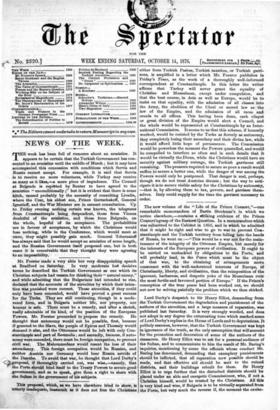This proposal, which, as we have elsewhere tried to show,
is utterly inadequate, inasmuch as it does not free the Christiana either from Turkish Pashas, Turkish taxation, or Turkish garri- sons, is amplified in a letter which Mr. Forster publishes in Friday's Times, as the work of a thoroughly well-informed correspondent at Constantinople. In this letter the writer affirms that Turkey will never grant the equality of Christian and Mussuhuan, except under compulsion, and that the best course, in Asia as well as Europe, would be to insist on that equality, with the admission of all classes into the Army, the abolition of the Cheri or sacred law as the law of the Empire, and the admission of all races and creeds to all offices. This having been done, each vilayet or great division of the Empire would elect a Council, and the whole would be represented at Constantinople by an Inter- national Commission. It seems to us that this scheme, if honestly worked, would be resisted by the Turks as fiercely as autonomy, they completely losing their ascendany and their divine law, while it would afford little hope of permanence. The Commission would be powerless the moment the Powers quarrelled, and would be compelled to interfere so often and in such details that it would be virtually the Divan, while the Christians would have no security against military outrage, the Turkish garrisons still remaining. The pressure required to secure so poor a result would suffice to secure a better one, while the danger of war among the Powers would only be postponed. That danger is real, perhaps, though we do not trust Austrian threats ; but the way to anti- cipate it is to secure visible safety for the Christians by autonomy, —that is, by allowing them to tax, govern, and garrison them- selves. Italy could supply for the time the garrison necessary to order.


































